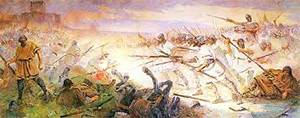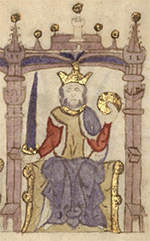King Afonso I of Portugal
Afonso I was the first true King of Portugal, ruling for more than 40 years in the 12th Century. He was known as the Conqueror and the Founder of the Nation. One of the peoples to invade the area that is now Portugal were the Burgundians, who, in the wake of the decline of the Roman Empire, did battle earlier with the Vandals and later with the Franks. Remnants of the Burgundian tradition lived on after the 6th Century defeat at the hands of the Franks, and a Burgundian noble named Henry declared Portugal independent, near the end of the 11th Century. Cementing that independence was Henry's son, Afonso Henriques, who was born in the first decade of the 12th Century. Historians cannot agree on either his birth date and year or his place of birth. Afonso's mother was Teresa, whose father was King Alfonso VI of León and Castile. Portugal (and it was the County of Portugal then) was in the midst of a struggle to retake lands conquered by the Moors. It was the same in what is now Spain, Portugal's neighbor on the Iberian Peninsula. Afonso's father, Henry, died in one of these battles, the siege of Astorga, in 1112. Teresa ruled in her own right for several years after that but was ultimately to ceded power to her half-sister Urraca of León. 
When Afonso turned 14, he began fighting in earnest against all foes, internal and external. He led a group of loyal soldiers to victory in 1128 at the Battle of São Mamede, defeating a force led by his own mother, who had a new hero in the wake of her husband's death. Afonso, declaring his capital to be Guimarães, took the title King of Portugal after defeating a Muslim force at Ourique in 1139, and the recognition of the Kingdom of León in 1143 is the founding date to which most historians point. Pope Alexander III recognized Afonso as King of Portugal in 1179. Afonso married Matilda of Savoy in 1146. They had seven children, three of whom lived to adulthood: Urraca, Teresa, and Sancho. 
One intervening event was a religious conflict in 1147. Afonso, still in the midst of the Reconquista, was planning an attack on Lisbon, then still held by Moorish forces. Afonso got some well-timed help from a group of soldiers bound for the Second Crusade, led by French King Louis VII and German king Conrad III. The Crusader army, blown off course and forced to shelter within Afonso's borders, helped him take Lisbon and then carried on to the Holy Land. Some of that Crusading force stayed behind, including an English priest named Gilbert of Hastings, who became Bishop of Lisbon. It was the first of two centuries of diplomatic overtures and niceties between England and Portugal. Afonso's last great success was defense against an Almohad invasion, in 1184. Afonso's forces withstood a siege from a much larger force and convinced the invaders to leave, injuring the commanding caliph, Abu Yaqum Yusuf, in the process. Afonso died on Dec. 6, 1185, not long after this victory. Succeeding him as King of Portugal was his son, who became King Sancho I.
|
|
Social Studies for Kids
copyright 2002–2026
David White




